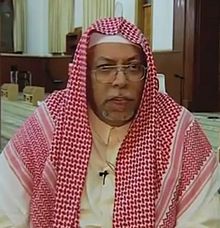Ali Ahmed Mullah
Ali Ahmed Mullah | |
|---|---|
على أحمد ملا | |
 Muazzin Ali Abdul Rahman Ahmed Mulla | |
| Chief Muezzin of Masjid al-Haram[1] | |
| Title | Sheikh, Qari, Muezzin |
| Personal life | |
| Born | 5 July 1947 |
| Nationality | |
| Notable work(s) | Served as a muezzin at the Masjid al-Haram for 45 years[2] |
| Religious life | |
| Religion | Islam |
| Jurisprudence | Hanbali |
Ali Ahmed Mullah (born 5 July 1947), is the veteran muazzin (caller for prayer) at the Masjid al-Haram in Mecca, Saudi Arabia for the past four decades.[3][4][5] Ali Ahmed Mulla is the longest serving muazzin for the Masjid al-Haram and has been following his family tradition in this profession since 1975.[1]
He is widely respected across the Muslim world and recordings of his Adhan are widely bought and enjoyed by Muslims and non-Muslims around the world through a wide variety of media. He also has stated that his main job other than a muezzin at the holy mosque is working in his self-owned business. He married 4 times had 3 children with each wife.[citation needed] His son, Atef bin Ali Ahmed Mulla, is now carrying on his legacy and he made his debut in Masjid-al-Haraam on 4 April 2022.[6]
Career
[edit]
Ali Ahmed Mullah began performing adhan at the mosque when he was 14, calling for prayer from the minarets in the absence of Abdul Hafeez Khoja, his maternal uncle, Abdul Rahman Mullah, his paternal uncle, and Ahmed Mullah, his grandfather, who were all muezzins at the mosque.[7][5] Mullah began performing before the introduction of loudspeakers, when muezzins stood at each of the seven minarets such as the Bab Al-Umrah Minaret, Bab Al-Ziyara Minaret, and Bab Al-Hekma Minaret and called for prayer. The timing to deliver the adhan was given by the chief of muezzins from Al-Shafie Maqam, near the Zamzam Well and each muezzin repeated what the first muezzin said until the adhan was completed. It was a tradition started by the Ottomans, which is continued today in Turkey.[7] After graduating from the Institute of Technical Education in Riyadh in 1970, Mulla worked as a teacher at Abdullah ibn Al-Zubair Intermediate School.[7] He was officially appointed muezzin at the Masjid al-Haram in 1984. He has also had the honor to perform adhan at the Al-Masjid al-Nabawi in Medinah on one occasion. Performing adhan at the Masjid al-Haram, for Muslims the holiest mosque in the world, has been claimed by him as a very great honor.[7]
See also
[edit]References
[edit]- ^ a b "কাবা শরিফের প্রবীণ মুয়াজ্জিনের কণ্ঠে আজান যেমন | কালের কণ্ঠ". Kalerkantho (in Bengali). 2021-09-06. Retrieved 2021-09-13.
- ^ "FaceOf: Sheikh Ali Ahmad Mulla, muezzin of the Grand Mosque in Makkah". www.arabnews.com. 2021-09-06. Archived from the original on 2018-06-13. Retrieved 2018-06-13.
- ^ Batool, Zehra (2021-07-17). "Sheikh Ali Ahmed Mulla, The 'Bilal' Of Grand Mosque Is The Voice You've Been Hearing For 4 Decades!". Parhlo. Retrieved 2021-09-13.
- ^ "'Bilal' - muezzin of Grand Mosque of Mecca for four decades". 2018-05-24. Retrieved 2021-06-24.
- ^ a b "FaceOf: Sheikh Ali Ahmad Mulla, muezzin of the Grand Mosque in Makkah". Arabnews.com. Arabnews. Retrieved 30 September 2020.
- ^ Debut Adhan | Sheikh 'Aatif Bin 'Ali Ahmed Mulla (Adhaan Fajr Al Awwal) at Masjid Al Haram., retrieved 2022-07-19
- ^ a b c d "Performing Azan at the Grand Mosque for Over 28 Years". Arab News. 2003-10-30. Retrieved 2021-06-27.
